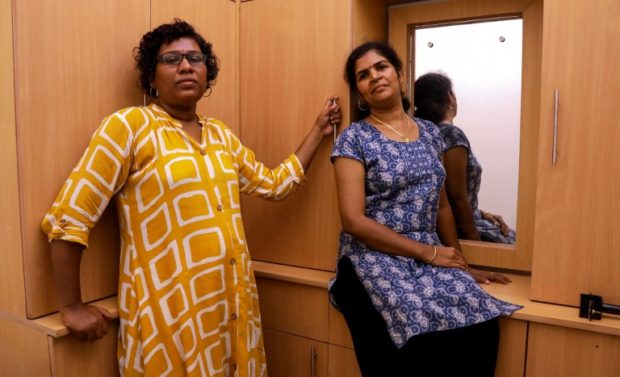Indian women seek police protection after entering Hindu temple

In this photo taken on January 11, 2019, Bindu Ammini (L) and Kanakadurga (R), the two Indian women who entered the Sabarimala Ayyapa temple, posed for photographs during an interview with the media in the southern state of Kerala. Image: STR/AFP
Two women who enraged conservatives by entering one of Hinduism’s holiest temples have asked India’s highest court for round-the-clock police protection, saying their lives are in danger.
Hindu devotees went on a violent rampage after Bindu Ammini and Kanakadurga entered Sabarimala in January — a hilltop shrine in southern Kerala state that for centuries was off-limits to nearly all women.
The Supreme Court in September overturned a ban on women of menstruating age from praying at Sabarimala but temple devotees refused to accept the ruling and prevented female worshippers from entering.
News that Ammini and Kanakadurga reached the shrine triggered days of violent protest, with one person killed and dozens injured in clashes with police that saw buses torched and bombs hurled.
The women’s lawyer, Indira Jaising, told the country’s top court on Thursday that the pair needed state protection as their welfare is in jeopardy.
Article continues after this advertisementKanakadurga, who goes by one name, was allegedly attacked by her mother-in-law on Tuesday after returning home and was admitted to hospital for her injuries.
Article continues after this advertisementShe had been on the run for days with Bindu Ammini, with the pair changing safe houses more than 10 times to avoid being tracked down.
The Supreme Court is expected to resume hearing their appeal for police protection on Friday, just days before it is due to start hearing a legal challenge on its ruling to lift the ban on female worshippers.
The temple — considered among the holiest in Hinduism and set on top of a hill in a tiger reserve — receives millions of pilgrims a year. It is dedicated to the celibate deity Ayyappa, and followers believe letting in women of menstruating age goes against his wishes.
After Bindu and Kanakadurga entered the temple, the head priest shut the temple doors for an hour-long “purification ceremony”, in line with the widespread belief that menstruating women are impure.
Those wishing to visit Sabarimala undergo a 41-day period of introspection and detachment known as vratha, abstaining from sex, meat, intoxicants and even shaving.
Only those who have observed the vratha and carry the irrumude, a symbolic offering, can enter the main courtyard up 18 divine golden steps. KM
RELATED STORIES:
Indian temple priests turn back women of menstruating age, defy court ruling